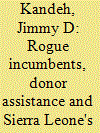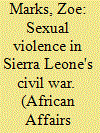|
|
|
Sort Order |
|
|
|
Items / Page
|
|
|
|
|
|
|
| Srl | Item |
| 1 |
ID:
087364


|
|
|
|
|
| Publication |
2008.
|
| Summary/Abstract |
The removal of the governing Sierra Leone People's Party (SLPP) from power through the ballot box in 2007 represents a watershed moment in the growth and maturation of Sierra Leone's teething electoral democracy. This is because the peaceful alternation of political parties in power tends to strengthen democracy and nurture public confidence in elections as mechanisms of political change. In contrast to what happened in 1967, when the SLPP derailed the country's first post-independence democratic experiment by orchestrating a military coup after losing power in parliamentary elections, the SLPP in 2007 found itself isolated both internally and externally, and could rely neither on the support of a restructured army and police nor on external patrons like the United Kingdom which, among other things, suspended budgetary support for the government pending the satisfactory conclusion of the elections. The emergence of the People's Movement for Democratic Change (PMDC), whose membership consists largely of disaffected former SLPP members and supporters, and the electoral alliance forged between the PMDC and the All People's Congress (APC) in the presidential run-off, doomed any chance the SLPP may have had of holding on to power. The elections were referenda on the SLPP, which lost both the presidency and the legislature because its rogue leadership squandered the goodwill of the public, misappropriated donor funds with impunity, and failed to deliver basic social goods and services.
|
|
|
|
|
|
|
|
|
|
|
|
|
|
|
|
| 2 |
ID:
131812


|
|
|
|
|
| Publication |
2014.
|
| Summary/Abstract |
Rape and sexual violence loom large in the study of civil war in Africa. Sierra Leone has been one of the most prominent cases for establishing rape as a 'weapon of war', yet little is known about how sexual violence was understood by commanders or combatants within the Revolutionary United Front (RUF). Mainstream analyses of armed groups and civil war rarely engage with gender dynamics, despite their centrality to war making, power, and violence; and research that does focus on sexual violence tends to overlook the complex internal dynamics of the groups responsible. This article examines the internal gender dynamics of the RUF from the perspective of male and female members in seeking to understand the perpetration of sexual violence. It shows that both formal and informal laws and power structures existed to regulate gender relations and control sexual behaviour within the group. It identifies four categories of women - non-wives, unprotected wives, protected wives, and senior women - and shows that women's interests and experiences of sexual violence were not homogeneous, but were instead shaped by their status within the group. In this way, sexual violence, examined in social context, provides an entry point for understanding how power, protection, and access to resources are brokered in rebellion.
|
|
|
|
|
|
|
|
|
|
|
|
|
|
|
|
|
|
|
|
|